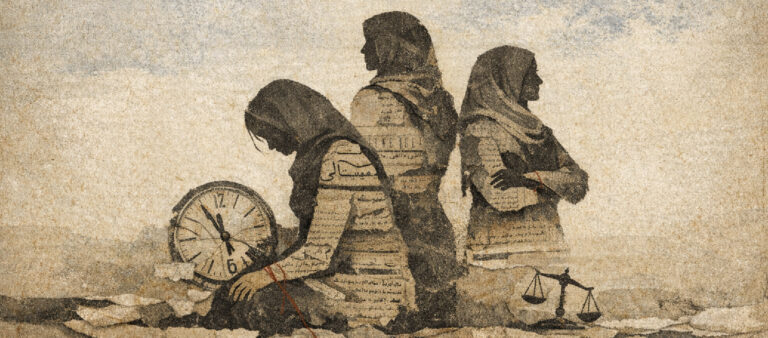We do not survive alone.
It was a bloody day indeed, the bloodiest in Lebanon since the civil war surpassed only by the subsequent atrocities that took place in Gaza. On Monday, September 23, 2024, Israel’s war expanded to southern Lebanon, Beirut’s southern suburbs, and the Beqaa Valley. Around 550 people were killed, including more than 50 children and 98 women. Among them was Anne, a young worker who had left her country to overcome life’s hardships through arduous labor. Anne did not survive the Israeli airstrikes; she was killed in an aerial raid that struck the house where she worked.
The war left widespread destruction in buildings and roads across many Lebanese cities, such as Tyre, a situation that had severe repercussions for all people in Lebanon, whether citizens, migrants, or refugees. Everyone faced a blockade that cut off food and water supplies, as well as all forms of healthcare.
We do not survive alone, nor do we flourish except when we resist for one another. These sacrifices must be met with a collective commitment to the ethics of justice, humanity, and freedom.
On October 6, 2024, the African Feminist Alliance issued a statement affirming that the survival and safety of marginalized communities—such as cleaning workers and refugees—are integral to the survival and safety of society as a whole, and constitute a central issue in confronting the Israeli colonial aggression against Lebanon, as the statement described it. The statement concluded with powerful words that enshrine a universal humanitarian principle and framework for addressing community issues and upholding international human rights in times of crises and wars:
“We do not survive alone, nor do we flourish except when we resist for one another. These sacrifices must be met with a collective commitment to the ethics of justice, humanity, and freedom—transcending the colonial definitions and hierarchies that separate them according to their own interests, viewing the people of the South as ‘human animals’ and collateral damage, denying them the right to land, to belonging, and even to existence.”

The migrant under mandatory isolation
Lebanon’s contractual labor system isolates migrants from the local population as well as from their own homelands. Recruitment agencies impose high fees on employers in Lebanon to hire migrant workers, while many employers confiscate workers’ passports—a clear violation of their freedom. This has led to varying degrees of hardship during the war, as some employers fled without providing any genuine sponsorship or protection for their workers, taking with them, or withholding, the workers’ official documents and preventing them from leaving.
Amid low wages and working conditions rooted in exploitation, a large portion of female workers were unable to leave the country or book travel tickets due to the exorbitant costs.
Thousands of migrant workers face deteriorating conditions.
Lebanon’s losses in that war amounted to approximately $9.4 billion. Despite efforts to provide aid to mitigate the impact, marginalized groups did not escape neglect—they remained among the forgotten, before, during, and after the war. Thousands of migrant workers and refugees continued to face deteriorating conditions.
.
Official international reports indicate that female labor in Lebanon amounts to approximately 250,000 workers from various African and Asian countries—around 76% of the migrant workforce. The vast majority are domestic workers, making up 99% of this labor sector.
Here, we highlight some of the damages and violations suffered by the most marginalized sectors even before the war. Reports indicate that cleaning workers were subjected to repeated physical and sexual assaults while sleeping on the streets without shelter, making them among the hardest-hit groups during the Lebanon-Israel war and its devastating aftermath.
Female labor in Lebanon amounts to approximately 250,000 workers from various African and Asian countries around 76% of the migrant workforce, the vast majority of whom are domestic workers, making up 99% of this sector.
Layla Issa, an activist and community coordinator at the organization “Kafa,” confirms that female domestic workers fled from threatened areas to other regions, alone and isolated, without any support or backing. As migrants by nature, they found neither homes nor shelter.
This placed them at risk of homelessness, as they remained on the streets in large numbers.
The greatest problem after fleeing the bombing zones to the streets was that wherever they went, they were expelled for being migrants, creating suffering for all. One of the most urgent demands, therefore, was to provide shelter for the workers.
Although some embassies provided shelter, it was neither adequately equipped nor accessible without extremely difficult conditions, whether for documented or undocumented migrants. These included restrictions on leaving, severe limitations on movement, or housing a worker alone, even though many were mothers with children. As a result, many chose to remain on the streets, in tents, makeshift shelters, or abandoned buildings under extremely harsh conditions. These included the spread of diseases, with many women suffering from skin conditions that in some cases developed into scabies, due to the lack of hygiene supplies, clean water, medicine, and healthcare.
Official Lebanese estimates indicate that foreign workers—mostly from Egypt, Sri Lanka, Ethiopia, the Philippines, and Kenya—make up 30% of the country’s formal workforce, distributed across both local and service sectors.
During the war, the number of pregnant women in Lebanon was approximately 11,600, with 4,000 of them in their third trimester. A United Nations report on women indicated that the number of displaced women heading households reached 12,000 during that period.
Issa adds:
“Indeed, many of them were subjected to physical and sexual violations, including verbal and physical harassment, bullying, ridicule, humiliation, and racism, often accompanied by being expelled from their shelters. I personally witnessed no fewer than three cases of women who experienced assaults and harassment.”
Issa emphasizes that many workers suffered severe losses, including all their belongings as well as their homes. Some of the workers, who had been settled in Lebanon for long periods—sometimes over ten, even twenty years—lost everything as a result of the war.
Undoubtedly, there are Lebanese women in domestic work, but their problems during the war were primarily related to financial needs and the lack of food for themselves and their children. Migrant women, on the other hand, had to meet all these needs by continuing to work even during the war, often for just a few hours a day, in order to secure the minimum necessities.
In fact, the very harsh living conditions that initially forced them to leave their countries in search of income for their families compelled them to remain under fire during the war, despite the extreme circumstances, so as not to return home and shatter their families’ hopes.
The government abandonment of its role
The state provided no support for the workers and took no action whatsoever. All initiatives came from civil society organizations, which managed to provide limited spaces for warmth and blankets, but this was far from sufficient. These organizations are small, and the intensity of the bombing, along with the difficulty—or rather, the impossibility—of moving between cities, prevented many pleas for help from being answered, according to Ms. Layla.

Migrant female workers in Lebanon have made notable efforts in forming alliances such as “We, the Migrants,” as well as other groups and networks among themselves. During the war, these networks sought to organize aid as much as possible through appeals and calls for help, which had some positive impact in providing limited food. However, the lack of adequate food during the war left negative effects and vulnerabilities for the workers and their children.
Laws that entrench corruption, exploitation, and dependency
The law respecting the rights of domestic workers requires substantial legislative and political measures. Although women enter Lebanon as workers, labor protection laws do not apply to them under Article 7 of the Labor Code, which states:
“The employee must comply with the instructions of the institution’s manager and direct supervisors, whether written or verbal, and carry them out without the right to question the form, reasons, or appropriateness of these instructions. In the event of an error in the instructions or a clear violation of this system or the institution’s interest, the employee has the right to request written confirmation from the issuer before carrying them out.”
The issue of the sponsor or “kafala” system, which ties a worker’s legal residency to their contractual relationship with an employer—means that when the relationship ends, even in cases of abuse, the worker becomes undocumented. This forces workers to endure the harshest working conditions, which can often involve exploitation and violations.
This system has faced longstanding opposition and a history of struggles aimed at abolishing or dismantling it. In Lebanon, the Central Administration of Statistics maintains the only official record of migrant workers, which consists of work permits.
Ms. Layla points out that domestic workers already face extremely difficult conditions in Lebanon, as they work under the kafala system. Being women under this system, within the employer’s household, exposes them to the worst forms of abuse, exploitation, and mistreatment. These risks are further amplified in various ways under wartime conditions.
Domestic workers already endure extremely harsh conditions in Lebanon, as they work under the kafala system. Being women under this system, within the employer’s household, exposes them to the worst forms of abuse, exploitation, and mistreatment.
However, the women workers are highly aware of their rights and cause. They are active in seeking to improve their social, economic, and legal conditions, and they pursue multiple efforts to abolish the kafala system.
Issa adds: “We, as civil society organizations, are also intensifying our campaigns and demands to have domestic work included under labor law, meaning it should be recognized as an independent profession. Until now, domestic work is not classified as work or a job; rather, it falls under common custom or collective perception as a ‘woman’s natural role.’ Many families do not pay the worker any wages or financial compensation, considering the work to be exchanged merely for food and lodging provided in their homes.”
Workers need a union to guarantee their rights, preserve their active role in society, recognize the value of this delicate and demanding work, and ensure respect for the workers themselves.





















🙏 thank you